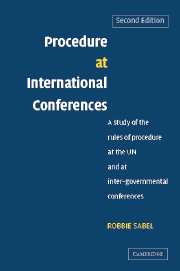 Procedure at International Conferences
Procedure at International Conferences Book contents
- Frontmatter
- Contents
- Preface to the second edition
- List of abbreviations and conference references
- Introduction
- 1 Historical development of rules of procedure of conferences and attempts to establish model rules
- 2 Adoption of rules of procedure
- 3 Rules of procedure and international law
- 4 Invitations, participation and credentials
- 5 Presiding officer and other officers of the conference
- 6 Meetings
- 7 Statements by delegations
- 8 Submission of proposals
- 9 Adjournment and closure of debate
- 10 Amendments
- 11 Withdrawal and reconsideration of motions
- 12 Procedural motions and points of order
- 13 Priorities between different proposals
- 14 Decision taking and method of voting
- 15 Majority required
- 16 Consensus
- 17 Separate votes
- 18 Conduct of voting – interruption of voting and correction of vote
- 19 Languages, records and documents
- 20 Committees
- 21 Suspension and amendment of rules of procedure
- Bibliography
- Index
2 - Adoption of rules of procedure
Published online by Cambridge University Press: 22 July 2009
- Frontmatter
- Contents
- Preface to the second edition
- List of abbreviations and conference references
- Introduction
- 1 Historical development of rules of procedure of conferences and attempts to establish model rules
- 2 Adoption of rules of procedure
- 3 Rules of procedure and international law
- 4 Invitations, participation and credentials
- 5 Presiding officer and other officers of the conference
- 6 Meetings
- 7 Statements by delegations
- 8 Submission of proposals
- 9 Adjournment and closure of debate
- 10 Amendments
- 11 Withdrawal and reconsideration of motions
- 12 Procedural motions and points of order
- 13 Priorities between different proposals
- 14 Decision taking and method of voting
- 15 Majority required
- 16 Consensus
- 17 Separate votes
- 18 Conduct of voting – interruption of voting and correction of vote
- 19 Languages, records and documents
- 20 Committees
- 21 Suspension and amendment of rules of procedure
- Bibliography
- Index
Summary
The adoption of conference rules of procedure
The principles behind the adoption, by conferences, of their rules of procedure have generated very little debate at conferences, nor have they generated much academic discussion. This is remarkable as the issues involved touch on some fundamental principles of international law, including the process of formation of custom, treaty-making procedure and the role of tacit consent.
The independence of an international conference
An international conference of plenipotentiaries, unless it is a subsidiary organ of an international organisation, is an independent body. ‘No existing agency has the power to lay down rules of procedure or determine the competence and organisation of conferences in general.’ The Secretary-General of a conference convened by the League of Nations informed a delegation that:
According to the procedure followed at all conferences held under the auspices of the League of Nations, the Conference alone has sovereign powers; it may take whatever decisions it thinks fit.
Rosenne writes that: ‘The experience of the Convention on the Status of Refugees suggests that a Resolution of the General Assembly, whatever its persuasive value, cannot bind an ad hoc diplomatic conference, which has an autonomous existence of its own and is, in the words of a representative of the Secretary-General, a “sovereign body”.’ A recent comment on this issue is that “the relationship with the international organization does not prevent such conferences of disposing freely, and in an autonomous and final way, of the task entrusted to them”.
- Type
- Chapter
- Information
- Procedure at International ConferencesA Study of the Rules of Procedure at the UN and at Inter-governmental Conferences, pp. 19 - 30Publisher: Cambridge University PressPrint publication year: 2006


